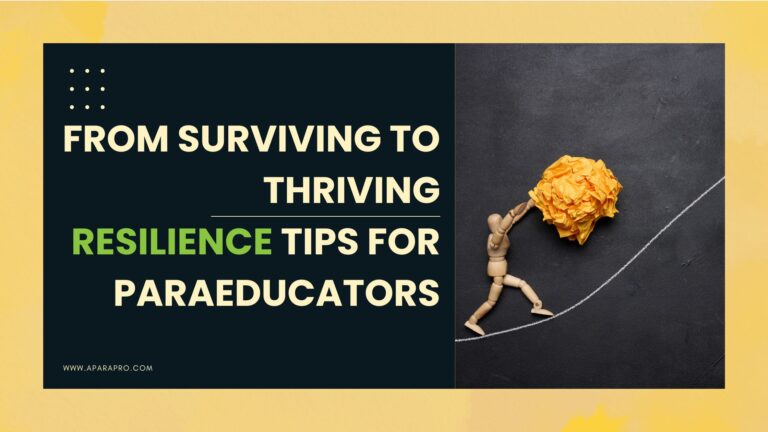25 Time Management Tips for Paraeducators
Hey there, fellow time-crunched para!
Let's face it, we all have the same 24 hours in a day, and it never feels like enough. But what if I told you there are simple ways to make the most out of the time you have?
Yup, you heard that right!
It's all about mastering the art of time management. And trust me, it's not rocket science! In fact, most of us start out with good intentions, but then life gets in the way, and we end up feeling like we're drowning in tasks. So, what's the biggest culprit behind our time woes? Let's dive in and find out!
Time Management Tip for Paraeducators: Interruptions
Time management is super important, especially when you're a paraeducator! Interruptions can really steal a lot of time from your day, so here are some tips to help you deal with them: interruptions

1. Allocate Time for Interruptions
Unexpected situations always arise, and they can easily throw you off course. Allocating time for interruptions can help you deal with them better. For example, if someone walks into the classroom, let them know that you can only spare five minutes. If they're still there after five minutes, say that you're sorry, but you need to get back to work.
2. Try Planning Your Day the Night Before!
It might sound simple, but it can make a huge difference in how productive and focused you are throughout the day. When you plan ahead, you'll have a clear starting point and know exactly what you need to accomplish.
3. Let's Talk About Managing Your Phone Conversations
They can be a huge time sink if you're not careful. So, try planning your calls ahead of time. This way, you're in control of how long the conversation lasts. And if you need to end it, it's okay to politely let the other person know that you have to go. Remember, you don't have to be someone's sounding board for all their problems. Your time is valuable too!
4. Don’t let technology disrupt your time management.
Social media and email can quickly eat up your time. If you need to be on social media, schedule a specific time for it, like ten minutes during lunch. Set an alarm to remind yourself when it's time to get back to work.
5. Analyze your Interruptions
When interruptions happen, it's important to know what's urgent and what can wait. You don't have to drop everything and fix someone else's problem just because they want you to. At work, it's common for people to dump their responsibilities on you. While it's okay to help out sometimes, you don't want it to become a regular thing.
Remember that you have your own work to do and your own priorities to focus on. Don't let others' urgent requests take over your time and make you fall behind. Take a step back and evaluate what truly needs your attention and what can wait until later.
Time Management Tip for Paraeducators: Prioritizing
So, you've got a lot on your plate, right? Like a ton of stuff to do in a day, and it can be overwhelming.
But don't worry, you're not alone! The key is to figure out what's important and what can wait. You gotta prioritize, baby!

That means making a list of what needs to be done and putting the most important stuff at the top. That way, even if you can't get everything done, at least you tackled the most important tasks.
Plus, it'll feel really good to cross those items off your list!
6. Tackle the most important item on your to-do list!
Here's a little secret: it's better to start your day with the most important thing on your to-do list. Not only does it give you a boost of feel-good hormones, but it also makes you feel like you can conquer anything else on your list.
And let's be honest, seeing progress is pretty darn motivating!
If you start with the easy stuff and put off the important tasks, you might end up feeling anxious about not getting everything done. So, get the tough stuff out of the way first and you'll feel like a rockstar for the rest of the day.
7. Say no to things that will eat up your time!
Here's the deal: you can't do everything and you definitely can't attend every single meeting or activity that comes your way. It's important to prioritize and pick and choose wisely.
If you working in the classroom and you're already swamped with tasks, it's important to decide which events or meetings will actually benefit you. You don't want to overload yourself with more work or time-consuming events.
So, choose the ones that will benefit you the most both personally and professionally. Don't get sidetracked by something that's interesting but not practical for your schedule. It's okay to say no and prioritize your time.
8. Get your Sleep
Listen up! It might be tempting to sacrifice sleep to get more things done, but it's not a good idea in the long run.
When you don't get enough sleep, it messes with your focus and productivity. You might end up making mistakes and having to redo work, or just feeling sluggish all day.
Plus, it weakens your immune system and you could get sick more easily, which will just make you lose even more time. Trust me, being well-rested is the key to being a good time manager.
So don't skimp on those Zzzs!
9. Energize with Exercise
If you're struggling to manage your time, don't forget the power of exercise!
Not only does it keep your energy levels up, but taking a break from work and personal responsibilities can help you come back with a clear mind and fresh perspective.
This means you can focus better, be more productive, and save time in the end.
10. Take Breaks
It might seem counterintuitive, but taking breaks throughout the day can actually improve your productivity. Studies have shown that taking short breaks can help to improve focus and concentration.
Try taking a 5-10 minute break every hour or two to stretch, walk around, or grab a snack. This can help to recharge your batteries and keep you feeling refreshed and focused throughout the day.
Time Management Tip for Paraeducators: Perfectionism
Paraeducators may feel pressure to perform perfectly in their role, but this can lead to stress and poor time management. Here are some tips to help you let go of perfectionism and manage your time effectively.

11. Don't Overload Yourself
As a paraeducator, you may have a long list of tasks to complete. However, trying to do everything at once can lead to frustration. So stop trying to juggle multiple tasks at once, it'll only lead to burnout.
Instead, focus on what's most important and on one task at a time and complete it before moving on to the next. Remember, you don't have to finish everything in one day!
12. Set Time Limits
Stop letting tasks pile up! Even if you're not a perfectionist, this tip can do wonders for your time management skills. When you have a project to complete, break it down into smaller parts and give yourself a time estimate.
For example, if you're responsible for creating a visual aid or presentation for a lesson, like a PowerPoint or poster board, estimate how long it will take to complete. Or if you're preparing materials for a classroom activity or project, like a science experiment or art project, divide the tasks up by how long they'll take. And when working on a larger project with a deadline, divide it up into manageable chunks based on the time you have. Don't forget to factor in potential interruptions and obstacles that may come up along the way.
And if you're working with individual students or small groups on specific tasks, like practicing reading or math skills, set a time limit for each task. This will help you stay on track and make the most of your time.”
13. Don’t Jam-Pack Your Schedule with Tasks Back-to-Back
It's important to have some downtime – even if it's just a few minutes – for your brain to unwind and recharge. Mental fatigue can be more tiring than physical exhaustion.
Just like your body, your brain needs some rest and relaxation after working on a task for a while. Take a break and do something you enjoy in between your to-do list items or simply do nothing at all. Your brain will thank you!
14. Divide all your personal and professional tasks into manageable chunks of time.
As a paraeducator, you may have recurring duties like organizing classroom supplies before the start of each school year or helping students prepare for standardized tests during certain months. Make sure to schedule those tasks on your calendar to avoid last-minute stress.
If you're in charge of creating lesson plans or grading assignments, set aside specific hours or days for those tasks. And don't forget to give yourself a break in between – maybe schedule a quick walk outside or a snack break.
Just like how you plan for your personal life, make sure to schedule important events or meetings for your work as well. For example, mark on your calendar when progress reports are due or when there's a parent-teacher conference. This way, you won't be caught off guard and can prepare ahead of time. By planning ahead, you'll be able to stay on top of your game as a paraeducator.
15. Trim Your To-Do List
Take a look at your to-do list, whether it's for work or home, and try to cut it down. As a paraeducator, you likely have many tasks to juggle throughout the day, and it can be overwhelming to try and do it all.
It's better to have a shorter list of things that are realistic to accomplish within the given time frame. This will help you feel more accomplished when you complete everything on the list, rather than feeling defeated because you couldn't finish everything.
Remember, it's okay to prioritize and leave some things for another day.
Time Management Tips for Paraeducators: Organization
Let's face it, we all have messy areas in our lives. It might be our work desk or our bedroom that's a mess. But it's important to know that being organized can really make a big difference in how you manage your time.

So, start by decluttering your workspace or classroom, and throw away or donate items that you don't need anymore. This will help you focus on the important tasks that need to be done, and you won't waste time searching for things you can't find.
16. Simplify Your Life: No Need for Elaborate Organizing Systems
When it comes to organizing your work and tasks, remember that simple is often better. Elaborate systems that take up a lot of your time can actually be counterproductive.
Instead, try using simple tools like an expandable folder to keep track of student assignments or a filing cabinet with hanging folders for art project ideas. Or keep it all digitally.
The key is to find an organizational system that works for you and that you can maintain without it becoming a burden. By keeping it simple, you'll be able to stay on top of your duties and be more productive in your role as a paraeducator.
17. Just Do It! Stop Procrastinating
It's a common problem for many people, but it's especially tough when you have paraeducator duties to complete. We all have tasks we'd rather not do, but it's important to tackle them head-on. The longer you wait, the more daunting they become.
One of the biggest time management issues for paraeducators is dealing with paperwork. It can be overwhelming, especially if you're still using paper files. If you can, try switching to electronic file-keeping to help reduce clutter and make things more manageable. However, there may be some documents you need to keep on hand, like sensitive information.
When you receive important paperwork, deal with it as soon as possible. Don't let it pile up on your desk or in your inbox. If you need to make a phone call or take another action before you can file the paperwork away, create a note in your planner to remind you to do it. By tackling tasks as they come up, you'll feel less overwhelmed and be more productive overall.
18. Group Tasks Together to Save Time
Whether you're at home or in the office, grouping similar tasks together can be a game-changer for managing your time. If you have to run errands, plan them all for the same day and in the same area to avoid unnecessary driving and save time.
At work, group similar tasks by day and by difficulty to streamline your workflow. And, if you have to drop off something at someone's office, do it on your way to a meeting to avoid wasting time later.
Being organized and grouping tasks together can help you stay on top of your workload and free up more time for the things you enjoy.
19. Have a calendar for both home and office.
You might want to get a calendar with big blocks so you can easily write in your appointments. These types of calendars can help you get a better idea of your day, week, and month in one glance. So ditch those small calendars and upgrade to a larger one for better time management!
It's important to keep it in a visible spot, like on your desk or wall, so you can check it out every day.
20. Utilize technology to help with time management.
Want to make your life easier? Consider using technology to help manage your time! With so many apps, programs, and tools available, there's something out there for everyone.
If you struggle with keeping track of your tasks, try a to-do list app to help you stay organized. Or if you need help scheduling your day, consider using a calendar app to keep track of your appointments and deadlines.
There are even time-tracking apps available that can help you identify where you're spending too much time and where you can improve your productivity.
So take some time to do your research and find the apps and tools that work best for you. Once you incorporate them into your daily routine, you'll see how they can help you become more efficient and get more done in less time.
Time-Saving Hacks for Paraeducators
Want to improve your time management skills? Start by finding lost time! Lost time is the time that you didn't even realize you were wasting. It's like finding extra cash in your piggy bank that you didn't know you had.

By identifying these pockets of wasted time, you can make better use of them and become more efficient. So take a look at your daily routine and see where you can find those extra minutes or hours. You might be surprised at how much more you can accomplish!
21. Don’t waste the time that most people do.
You can improve your time management skills by finding opportunities to use those small pockets of time that often go unused. Don't just think about large chunks of time; even 10 or 15 minutes can be productive!
For example, if you have some downtime between classes or during lunch, use that time to prepare materials for the next lesson, grade assignments, or respond to emails. Don't waste time waiting in the hallway or chatting with colleagues if you have tasks to complete.
Similarly, if you're supervising students during recess use that time to catch up on paperwork, read professional development articles, or plan upcoming lessons. You can even bring a tablet or laptop with you to work on tasks while keeping an eye on the students.
By maximizing these small pockets of time, you can get more done and feel less overwhelmed during the rest of your day.
22. Let go of time drainers and focus on important tasks
Let's talk about priorities. Sometimes, it can feel like everything on our to-do list is equally important, but that's not always the case. Take a step back and evaluate what tasks are truly important for your personal and professional success.
Stop doing things that drain your time and aren't contributing to your goals. If it's not something that will help you be happier or more successful, then it's not important! Focus on what really matters and don't get bogged down by tasks that won't move you forward.
23. Stay Ahead of the Game: Don't Fall Behind
Feeling stressed and overwhelmed with your schedule? One way to alleviate this is by getting things done ahead of time.
When you're ahead of schedule, you'll have more time to focus on other tasks and activities, and it can also give you a sense of accomplishment.
Don't wait until the last minute to complete tasks – start early, plan ahead, and get things done in advance. This way, you'll have a buffer in your time management and be able to handle unexpected challenges that may arise.
24. Share the Load by Delegating to Make Time Management Easier
Delegation is an invaluable tool for paraeducators who want to manage their time effectively.
On a personal level, delegating tasks can free up more time to focus on other areas like spending time with family or engaging in hobbies.
On a professional level, delegation can help to manage tasks more efficiently and allow paraeducators to take on more responsibilities, such as creating and managing student behavior plans, providing support for students with special needs, and attending meetings. Delegation can also help to lighten the workload and make the most of your day.
25. Manage Emails Like a Pro
Staying on top of emails can be a real challenge for paraeducators. To make sure you're not getting sidetracked with emails, set aside a specific time to check and respond to them and set a time limit on how long you'll take to reply.
If they're not important, don't save them – they'll just pile up in your inbox.
Conclusion
Overall, time management is an important tool for paraeducators. By following the tips outlined in this post, you can better organize your day, reduce distractions and interruptions, and increase your overall productivity. Don’t hesitate to leave a comment and share your own personal strategies and experiences with time management!









